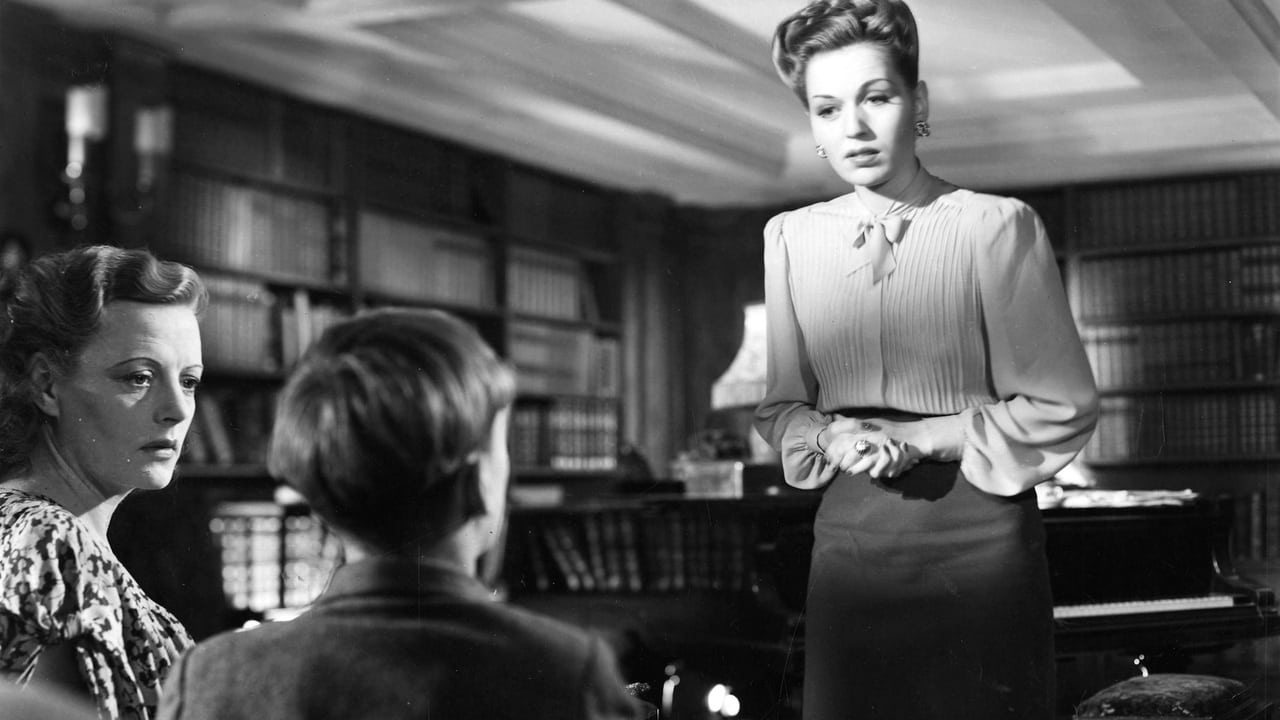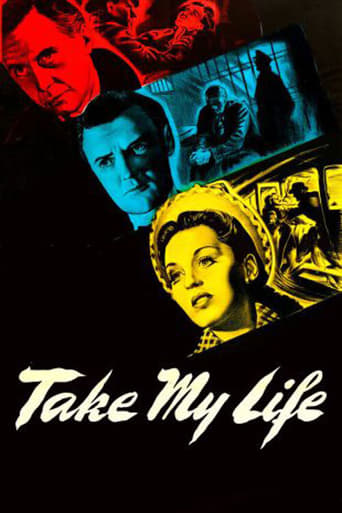Btexxamar
I like Black Panther, but I didn't like this movie.
Infamousta
brilliant actors, brilliant editing
Teddie Blake
The movie turns out to be a little better than the average. Starting from a romantic formula often seen in the cinema, it ends in the most predictable (and somewhat bland) way.
Darin
One of the film's great tricks is that, for a time, you think it will go down a rabbit hole of unrealistic glorification.
jadedalex
I found this a very quick-paced thriller. Neame's camera work found fresh ways to do clichéd scenes. So many movies are described as 'Hitchcockian', but rarely deliver the Master's unique touch. I don't find Neame's work here a ripoff of Hitch's genre, but rather an homage to the great director.Like Sir Alfred, Neame has the wrong man accused of murder. In fact, male lead Hugh Williams is quite ineffectual at any sort of defense, since the movie opens with him on trial for murder and quickly found guilty. That the fine British character actor Francis L. Sullivan is given such a short role as prosecuting attorney is fine with me. He is cleverly used to state his case against the defendant, leading into flashbacks of the drama as it really happened.This leaves the lovely Greta Gynt to portray opera star and first class detective. Yet another Hitchcock theme is revealed as the cops and the justice system yet again fail an innocent man. It's up to Ms. Gynt to sort out the clues that lead to the real killer.The train sequences definitely reminded me of Hitchcock's 'The Lady Vanishes', and there is a plot twist near the end which is quite delicious.I suggest that previous reviewers who found nothing interesting in this movie must have been half asleep during their viewing. I was riveted by Neame's work with the camera, and it's definitely a movie worth a second look. Williams as the male lead is fairly useless, a handsome man who could easily be taken as a ne'er do well living off his wife's successful operatic career. So it is up to the strong performance of Gynt's character to drive the story to its compelling end.This movie has been described as 'film noir', but I see it as more of a 'thriller'. And like the best of Hitchcock's suspense films, this one delivers.
Robert J. Maxwell
Near the opening, Hugh Williams' wife, Greta Gynt, in a fit of jealousy, throws an item from her dressing table at him and it glances off his forehead. I was shocked. I'd always thought that the Brits, so skilled in the conversational arts, left those sorts of physical rows to us Americans.I recall such an exchange with my own wife. It was Hallowe'en night and she was dressed in a tiger costume and a plastic Mickey Mouse mask. I'd been baking and began throwing paper-thin cupcake tins at her. She danced from side to side, evading every one. I stopped when I realized what the scene would look like to an outsider: A man in an apron hurling tin cups at someone in a tiger outfit wearing an immutable Mickey Mouse grin. If I hadn't been disabled by laughter I would have tried strangling her, as Hugh Williams strangles the next woman, an ex lover, he has an encounter with.At least that's what he's accused of by Francis X. Sullivan, representing the Crown. Sullivan's booming narration talks us through the prosecution's view of events. The booming baritone is illustrated by multiple flashbacks, all of which make Williams look guilty as hell. All except one, which reveals the murderer to be a man we've never met. Sullivan's hypothetical scenario is interrupted from time to time to show us the rounds of the real killer. He has evidently been told never to blink.The victim, by the way, William's ex lover, is Rosalie Crutchley whose features and dark eyes are both striking and attractive. She was the arid housekeeper in "The Haunting." Williams' wife, Greta Gynt, is horribly upset that her husband is in the Crowbar Hotel and they're dusting off the gallows for him. She helps by following every possible link, and one of them improbably leads her to the murderer. The pace of the story picked up markedly. One of the relay points is the shop of a devoutly Presbyterian photographer in Edinburgh and it's rather funny. Nice to have a light spot in a drama like this. The climax is again violent, recalling Hitchcock's "Shadow of a Doubt." In any case, not to worry. Near the beginning, when Crutchley writes a note to Williams, it's used as evidence against him in court. "Alas, the love of women! it is known To be a lovely and a fearful thing." The trouble begins with Lord Byron, then, but it also ends with Williams and Gynt together again, as if they'd never been apart. "I have great hopes that we shall love each other all our lives as much as if we had never married at all." A snappy and suspenseful thriller. I enjoyed it.
howardmorley
I love this period of British films where everyone is relentlessly middle class, even the children who say expressions such as "super" & "wizard" and the women all speak with Celia Johnson like cut glass accents.Indeed I read today (Daily Mail 9/10/14) that this is the accent that the British most trust.Well to this 1947 film.For me Marius Goring was the stand out actor playing the headmaster Sidney Fleming.Another of his menacing roles was in "Highly Dangerous"(1950) as a Balkan police inspector with Margaret Lockwood.Francis L. Sullivan was in his element yet again playing a criminal prosecuting barrister (see him in "Great Expectations" (1946).Sharp eyed viewers may have noticed the uncredited performances of Maurice Denham playing defending counsel and a newsboy at York station played by the future Billy Bunter- (Gerald Campion) on children's 1950s BBC TV.In 1947 all middle class people dressed up to visit the opera/concert/theatre with women in long evening gowns/jewels and the men smartly dressed in dinner suits with bow ties.One of the audience members actually used that theatrical cliché " Darling you were fabulous!" after listening to Greta Gynt (Philippa Shelley) miming to an operatic aria dubbed on by a professional singer.I will say though as an artist that this actress had lovely cheekbones.Huw Williams (father of Simon Williams) in the male lead as the innocent man charged with the strangulation, I always find just adequate.Sorry to damn him with faint praise.Ronald Adam, who often pops up in 1940s films, such as "Green for Danger", played the supposedly deaf detective who became the vital witness Philippa Shelley needed to save her husband.It certainly kept my interest to the end being well scripted and I rated it 7/10.
bob the moo
Nicholas Talbot is the husband and manager of wealthy opera singer Phillipa Shelley. Tensions in the marriage are raised when Nicholas meets Elizabeth, an old flame, after a show. Hours later Elizabeth is killed at her flat with Nicholas not having an alibi. On trial for murder he looks to be heading for certain imprisonment – but Phillipa starts following her own clues in an attempt to uncover the truth.I didn't have a clue what this was about until I watched it – so I had no preconceptions about it. It seemed to start well enough as the stall was laid out and clues were shown. However it quickly became dull and only really got better when the wife started looking for clues herself. However the thing that actually helps her find the real killer is such an absurd plot twist that it's more silly than anything else. The final 10 minutes are good but can't make this anything more than a dull mystery.The cast are quite good but don't really have any character. I thought the fat lawyer character would play a bigger role and potentially have character a la Charles Laughton in Witness for the Prosecution, however he didn't. Similarly the accused and his wife are quite cardboard.Overall it's not terrible but it has nothing whatsoever that will stay in your memory. Not really worth watching.


